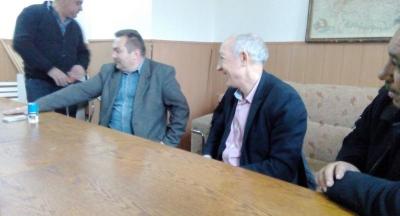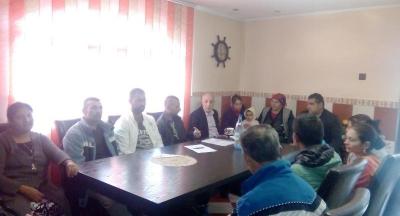Calvini
*Disclaimer: The information and views set out in this page do not necessarily reflect the official opinion of the Council of Europe and/or the European Commission. Neither the Council of Europe, the European Commission nor any person acting on their behalf may be held responsible for the use which may be made of the information contained therein.
Last update 11/10/2016
Calvini is located in the North-Western part of Buzău County in Romania, Calvini is the administrative center for 5 villages (Calvini, Bâscenii de Jos, Bâscenii de Sus, Frăsinet and Olari). According to the last census the population is 4,363 with 1,832 recorded as members of the Roma community. However, local estimates place the number of Roma citizens above 2,000, the majority of whom are from the “ursari” group and a small minority of “kalderash”. Most Roma live in Calvini and Bâscenii de Jos.
Traditionally, many Roma in Calvini are fruit vendors or aluminium goods manufacturers - there are 60 registered vendors in the Roma community. In many cases, Roma families with fewer prospects choose to look for job opportunities in Western European countries, in particular France, Spain, England, Denmark and Sweden. The unemployment rate among the Roma population is as high as 80%, which could explain the migration trend combined with other factors.
Most Roma inhabitants in Calvini speak Romani, a circumstance which local schools have tried to adapt to by ensuring classes are in the mother tongue of Roma children. Nonetheless, the school dropout remains a serious concern in the municipality, an issue due either to the professional activity of parents (vendors travelling through several municipalities), or to the decision to migrate. In order to help reduce the school dropout rate, several projects have been implemented in the past years in Calvini schools which have been led by UNICEF, as well as by the Community Development Agency of Buzau with the financial support of EEA & Norway Grants. An afterschool project designed to provide sustainability to these earlier initiatives is supported by the Daily Centre founded in Calvini through the Romanian Social Development Fund (FRDS).
From the point of view of housing and infrastructure, it is estimated that around 170 families in Calvini do not have property documents for their dwellings. A project run by the National Agency for Roma has been trying to address the issue of a lack of property documents. The Roma neighbourhoods in Calvini lack paved roads, running drinkable water and a proper sewerage system. The latter issue is also linked to a pressing public health issue and the construction of a water network is progress, a proper sewerage system is vital for the households that cannot be reached by vacuum trucks. In addition, the most deprived Roma families’ access to electricity and other amenities is limited by their inability to pay for these services.
With regard to community health, there is a need for a Medical centre in Calvini – which is indicated below in the long-term priorities of the Community Action Group (CAG). At the moment, all citizens in Calvini must travel 15 km to the nearby city of Pãtârlagele in order to consult a General Practitioner.
The ROMACT Process
With the Mayor’s signature on the Letter of Commitment on the 21st October 2015, Calvini joined the ROMACT programme. A Community Action Group (CAG) was formed and is composed of Roma citizens who began identifying the needs of the community in the months that followed joining the programme.
A Local Action Plan (LAP) concerning Roma citizen needs, was officially adopted by the Local Council of Calvini on the 1st of February 2016. Although the CAG did not have time to negotiate with the Local Authorities, the measures were on the whole already included in the plan prior to its adoption. In review of the LAP and in discussions with the ROMACT facilitator the conclusion was reached that most of their identified needs were already included. Also worth note is that the JAP was included in the Local Development Plan of the Municipality – The Action Plan for Roma Inclusion 2015-2020 is the 1st Appendix to the Local Council Decision HCL no.7/01.02.2016 of the Strategy for local development of Calvini.
At the moment, the CAG is showing signs of autonomy, with meetings organised by the CAG without the assistance or attendance of the ROMACT facilitator. The cooperation between the CAG and the local authorities is ongoing and developing into a regular method for the design of local policies regarding the Roma community.
Short-term priorities of the CAG:
| Short-term priorities of the CAG | Objective 1 | Objective 2 |
|---|---|---|
| Education | Extra-school activities for children: dance, music, wrestling, football and art classes; | “ Second Chance” programmes |
| Health | Building and equipping a medical centre |
Long-term priorities of the CAG:
| Long-term priorities of the CAG | Objective 1 | Objective 2 | Objective 3 |
|---|---|---|---|
| Employment | Building and equiping a factory for processing nut core (the fruit) | Founding of social enterprises | |
| Health | Creating a Permanent Centre within the Calvini – an Emergency Room with a full time programme | ||
| Infrastructure | Building a sewerage infrastructure and modernising water infrastructure | Paving the streets in the Roma community | Building a playground and a sport centre |
The LAP contains measures targeting education, employment, health, housing and small infrastructure, justice and public order, administration and community development. Most measures included match the needs identified by the CAG. Among the measures included in the LAP it is worth mentioning:
| Measures from JAP | Objective 1 | Objective 2 | Objective 3 |
|---|---|---|---|
| Education | Combatting school dropout (awareness raising for parents, support for teachers’ and mediators’ involvement) | Ensuring teaching in Romani language, raise awareness on affirmative action places in schools | Training teachers in inclusive education |
| Employment | Identifying and counseling job seekers of Roma origins (Employment Office) | Organising second chance schooling, as well as vocational training and self-employment coaching | Building a nut core factory in order to support Roma families who sell this product |
| Health | Employing a health mediator | Organising awareness raising campaigns on vaccines, family planning, etc. | Providing emergency funds for health-related situations: social aid for heating, emergency aids; |
| Housing | Obtaining property documents for illegal Roma dwellings in cooperation with the Prefecture of Buzau | Ensuring funding for facility projects in the Roma community of Bascenii de Jos (water, sewerage, paved streets, library, rehabilitation of the cultural centre) | Building of a sports centre and playground |
| Culture | Promoting Roma history and culture (including commemoration of the Roma Holocaust, Roma slavery, celebration of the International Roma Day) | Organising music, dance, drawing and football classes | |
| Justice and Public Order | Organising rights awareness campaign so as to prevent discrimination | Identifying and solving conflictual relations between families, communities or ethnic groups | |
| Administration and community development | Identifying and providing legal consultancy to Roma families living in illegal housing | Granting trade authorisations for Roma citizens who are street vendors |
The municipality of Calvini does not have a “project writing” department. There is only one person in charge of writing/implementing projects within the City Hall, who acts as contact person for the ROMACT Programme as well. The intervention of the ROMACT Programme is, therefore, deemed necessary to support the community. Two staff members were trained on relevant topics at the beginning of the implementation of ROMACT. In addition, 3 members of Calvini City Hall (including the Mayor) took part in the Project Management courses organized in Buzau county on 11-13 March 2016.
One of the main priorities of the local authorities is to access funds for the construction of a proper sewage system in the Roma community. The ROMACT expert, together with the ROMACT National Support Team, is currently assisting local authorities to identify and apply for the right funding. The targeted fund for this project is PNDR 2014-2020 – 7.2: Investments in creation and upgrade of small-scale basic infrastructure*.
A second line of funding through POCU 4.1** is targeted by the municipality and will be pursued with the help of the ROMACT expert. The project will aim to tackle some of the measures included in the Local Action Plan. The development of the application is currently in progress.
Other projects led by the municipality outside of the ROMACT programme which will impact the Roma community in Calvini are currently under development or have recently been completed are:
1) “Asphalting Roads of local interest in Calvini commune, Buzau county” (The Gaul Buzau Valley – Cislau) – The National Program for Rural Development Programme (PNDR) 2007-2013, coordinated by the Agency for Financing Rural Investments (AFIR). The implementation term is 13.01.2015 to 31.03.2016;
2) “Counselling in the daily centre, driveways and passages for passers-by, septic hole, water well, reservoir in water storage, chlorination station, pumping station, utilities and water connections in the Roma community of Biscenii de Jos village, Calvini commune, Buzau county” – The Romanian Fund for Social Development (FRDS), EEA & Norway Grants – RO10 Programme ” At risk Children and young people and local and regional initiatives for reducing national inequality and promoting social inclusion”. The implementation term is from 18.12.2014 to 30.10.2016;
3) "Extension and rehabilitation of the water infrastructure in Buzau county“, a project co-financed through the Operational Sectorial Environmental Program (POS Environment) 2007-2013, Priority Axis 1.
The commitment of local authorities to improving the situation of Roma citizens in Calvini is also expressed through the attention paid to Roma culture and history, and contributions to the celebration of the 8th of April – International Roma Day, which was organised by local authorities in 2016 with the cooperation of the CAG and other local stakeholders.
On 7 September, in line with measures included under the health chapter of the JAP, a vaccination information campaign was conducted upon the request of the CAG. More on this activity in this article.
* PNDR 2014-2020 stands for “Programul Naţional de Dezvoltare Rurală” (National Rural Development Programme), through which non-refundable funds are allocated from the European Union and the Romanian Government for the socio – economic development of the rural area in Romania.
** Priority 4, with €940 million, aims to promote social inclusion and to fight poverty. Integrated measures will help disadvantaged people, including Roma, to access the labour market, by improving their skills and supporting entrepreneurship and social enterprises, among other actions. Several vulnerable groups will be supported, such as homeless, persons suffering from dependence, victims of domestic violence or trafficking, prisoners or ex-offenders, elderly and disabled people. Specific support will also be provided to social services, such as social assistance, health and care services, including support the so-called "de-institutionalisation" (assistance to groups with care needs allowing them to live more independently instead of committing them in institutions). Source: http://ec.europa.eu/esf/main.jsp?catId=576&langId=en


